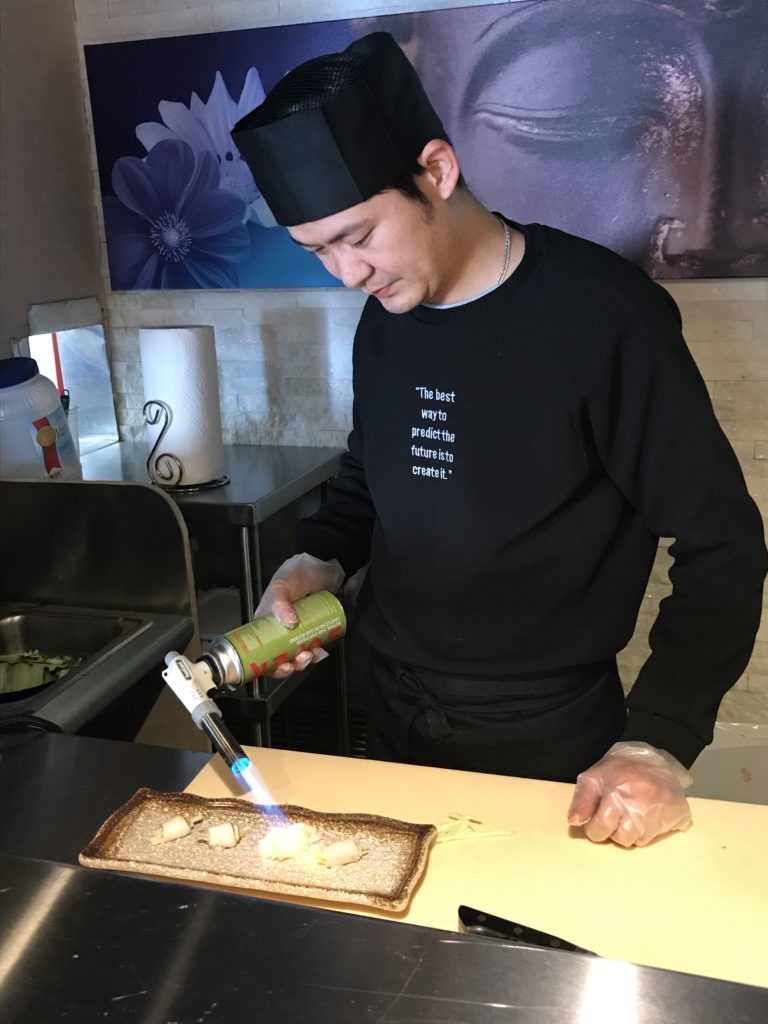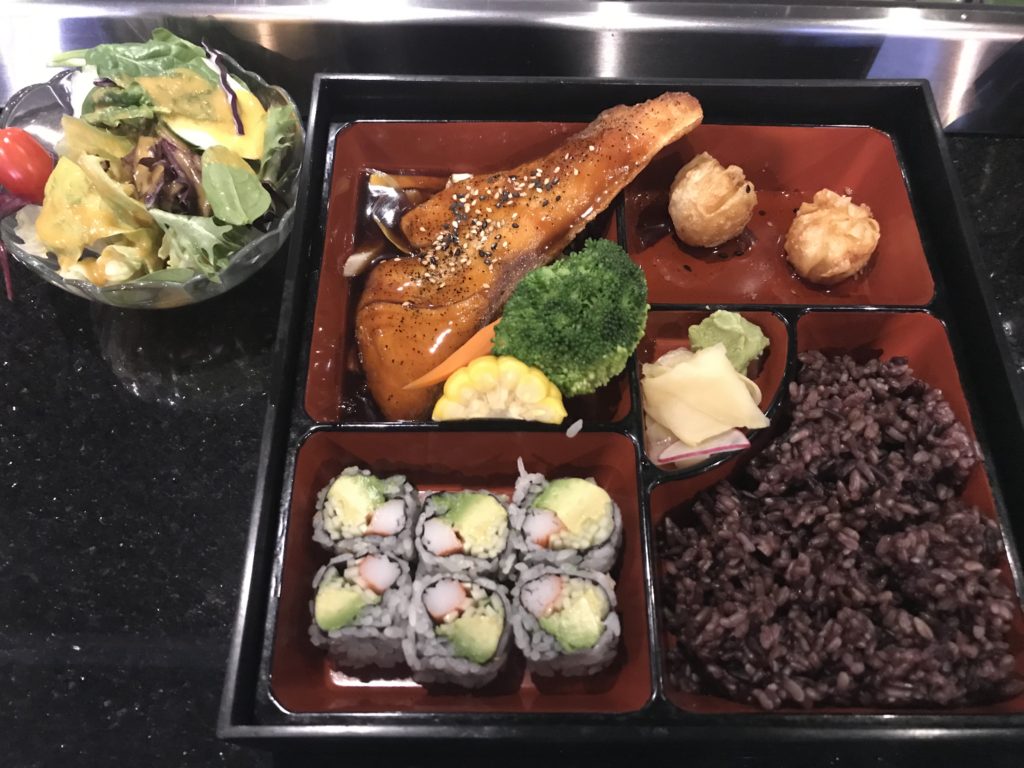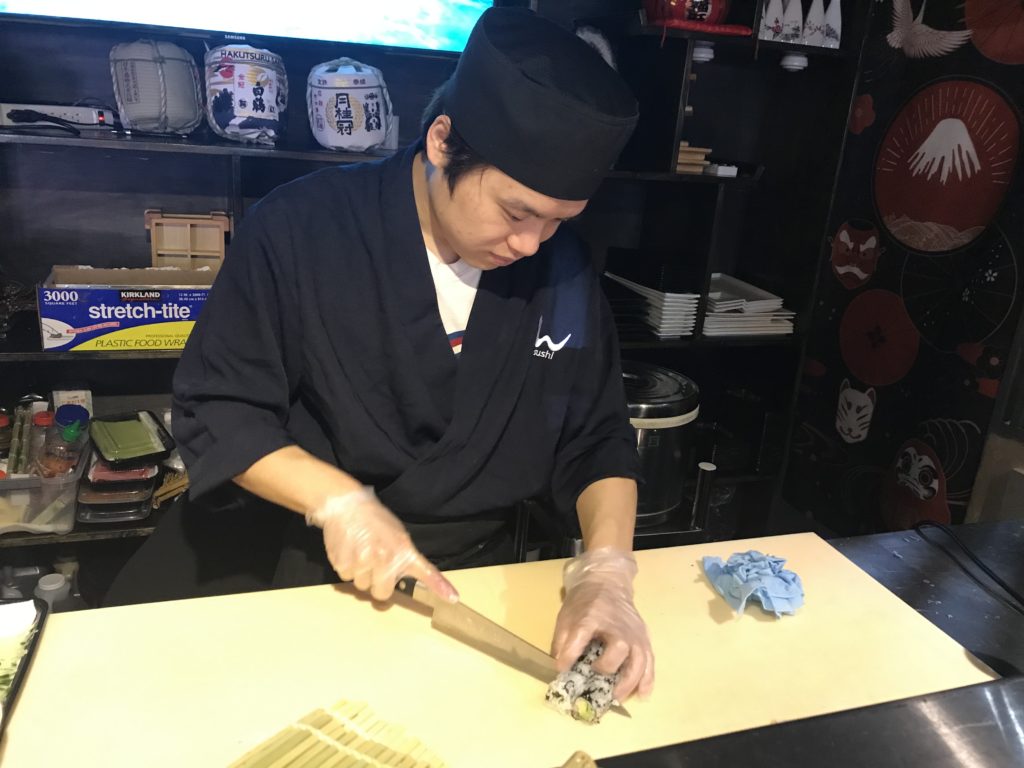Sushi Wen quietly opened its doors a month ago on Castleton Avenue in Staten Island on the first floor of a two-story residential building, its bright white and red “Grand Opening” sign a cheerful addition to the neighborhood, in sharp contrast with the dilapidated chemist shop and the plumbing supply store on the same block.
Chef owner Huang Liwen stands behind the modest sushi bar, surveying the ingredients he has to work with for the day’s meals. Careful calculations need to be made to keep a small restaurant like his profitable. Each morning, Huang drives out to the 8th Avenue part of Brooklyn’s Chinatown to purchase just enough fish to last a day or two. He also picks up his sushi chef, Yanming “Jeremy” Jiang. The two then return to Sushi Wen to begin the day’s prep work before the restaurant opens at noon.
Huang, 32, immigrated to New York in his twenties from Fujian province in China. His father had obtained legal status in the U.S. as a carpenter, and was able to sponsor his wife and his son. After working in various Japanese restaurants in the New York and New Jersey area, saving up, and with some help from family, Huang was able to buy the building that now housed Sushi Wen two years ago. His father helped him with much of the renovation work to turn a previous doctor’s office into a restaurant. Now Huang, his wife, and three children live upstairs in this small two-story building. With a burgeoning Chinese community nearby, Huang feels right at home in Staten Island, where he has befriended Chinese immigrants from all regions of China.
According to the 2017 American Community Survey, Staten Island’s population of 479,458 is 73.3 percent white. Chinese residents number 23,071 (4.8%), while only 35 Japanese people live in the borough. Huang doesn’t think it’s strange that a Chinese team is operating a Japanese restaurant: “For this location, a Japanese restaurant makes sense. There are a lot of white customers, and they want Japanese food,” said Huang in a soft southern Mandarin. Indeed, Sushi Wen’s opening has filled an unmet need.
Documentaries like “Jiro Dreams of Sushi” and the “Chef’s Table” episode about TK have shrouded sushi in a reverent mystique, with stories of chefs who train for years before they are allowed to touch the fish. When it comes to their craft, Huang and Jiang are more casual. “You just learn by working. You learn a little bit at one restaurant. Then you learn a little bit at the next restaurant,” said Huang, “First you start with making rice and slicing cucumbers, then you learn everything else.”
Jiang, 28 but looking much younger, has been working in restaurants since he was twelve, when he was still in Fujian. After immigrating to New York, he first worked at Chinese restaurants, but “the cooking made his skin break out,” he said, laughing. He soon switched to a Japanese restaurant where he trained for a year under another Fujianese chef, who in turn introduced Huang to him. Behind the counter, he worked swiftly, assembling order after order of California rolls and eel rolls as lunchtime takeout order tickets came in. Takeout accounts for about half the revenue, Huang said, and dine-in accounts for the rest.
Despite being a new restaurant, Sushi Wen already has a few regulars, one of whom is Yoshi Mullen, a Japanese resident of Staten Island. “I come here for lunch every Tuesday or Saturday,” Mullen said, “my husband, he loves German beer, so he eats at the German place a few minutes away.” Mullen orders a cucumber roll, and inquires about the king salmon, which at $12 per pound wholesale, is only available on the weekends. To make up for the missing menu item, Huang slices up octopus and drizzles each piece with a drop of truffle oil. He sends it to Mullen on the house.
Mullen, who is 70, credits vegetables and fish as the secret to her youthful looks. She met her late first husband when he was stationed in Okinawa in the air force in the 1950s, and immigrated to Staten Island to join his family when his service was up. Back then, there were “no Japanese people here. Once in a month, my husband would bring me to Manhattan for Japanese food and groceries.” She and her current husband used to go to a Korean restaurant a few minutes’ drive away, but has not gone back since she found Sushi Wen. “They must be thinking ‘what happened to her?’” she laughed.
Huang is proud of the fact he has already built a small but strong group of regulars. He takes good care of his customers, flitting about the small dining room to greet each guest and ask them their opinions on the food. He sends Mullen a fried banana dessert as she pretends to swat the free dish away: “but you’re not going to make any money this way!” After the check has been paid and the dishes cleared, Mullen left smiling, ready to fix her husband a meatloaf dinner, but knowing that the cuisine of her homeland is just a ten-minute drive away.
Tags: ethnic cuisine, fujianese, immigrant, japanese, NYC, restaurants, Staten Island



Your Comments